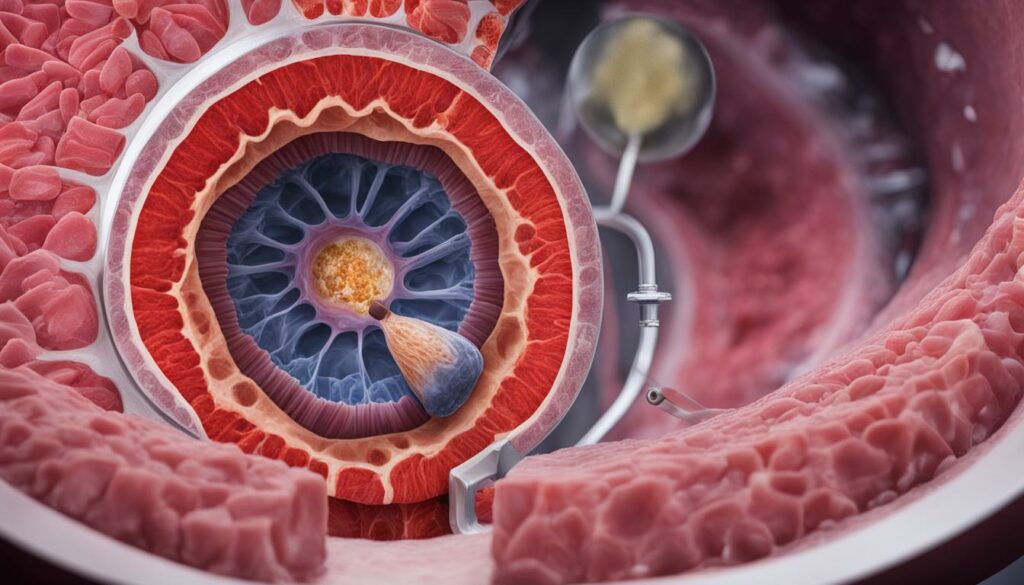Welcome to our comprehensive guide on stomach disease. In this article, we will explore the causes and symptoms of various gastrointestinal conditions that affect the stomach. Whether you’re experiencing abdominal pain, bloating, or other related discomfort, it’s important to understand the underlying factors contributing to these symptoms. By gaining insights into stomach disease, you can empower yourself to make informed decisions about your health and seek appropriate medical guidance.
Key Takeaways:
- Stomach disease refers to gastrointestinal conditions that impact the stomach.
- There are two types of stomach disease: functional and structural.
- Functional gastrointestinal diseases involve improper functioning of otherwise normal-looking organs.
- Structural gastrointestinal diseases involve abnormalities in the structure of the bowel.
- Common symptoms of stomach disease include abdominal pain, bloating, constipation, diarrhea, and nausea.
Common Types of Functional Gastrointestinal Diseases
Functional gastrointestinal diseases are the most common problems affecting the GI tract. These diseases are characterized by normal-looking organs that don’t function properly. Some of the common types of functional gastrointestinal diseases include:
- Irritable Bowel Syndrome (IBS): A chronic disorder that affects the large intestine and causes symptoms like abdominal pain, bloating, and changes in bowel habits.
- Constipation: Difficulty in passing stools regularly or experiencing hard, dry stools.
- Bloating: The sensation of fullness or swelling in the abdomen, often accompanied by excess gas.
- Diarrhea: Frequent and loose bowel movements.
These conditions can be caused by various factors such as a low-fiber diet, lack of exercise, changes in routine, stress, and certain medications. Symptoms may vary from person to person, but often include abdominal pain, gas, and changes in bowel habits.
Managing functional gastrointestinal diseases involves a combination of lifestyle changes, dietary modifications, and sometimes medication. It’s crucial to consult with a healthcare professional for an accurate diagnosis and personalized treatment plan.
Note: The image above visually represents the common types of functional gastrointestinal diseases. It is provided for illustrative purposes only.
Common Types of Structural Gastrointestinal Diseases
Structural gastrointestinal diseases refer to conditions that involve abnormalities in the structure of the bowel. These diseases can have significant impacts on a person’s digestive health and overall well-being. Understanding the common types and symptoms of structural gastrointestinal diseases is crucial for early diagnosis and effective management.
Some of the most common types of structural gastrointestinal diseases include:
- Diverticular Disease: This condition occurs when small pouches form in the lining of the colon, leading to abdominal pain, bloating, and changes in bowel habits.
- Colon Polyps: Colon polyps are growths that develop in the lining of the colon. While most polyps are harmless, certain types can increase the risk of colon cancer.
- Colon Cancer: Colon cancer is a malignant tumor that forms in the colon or rectum. It can cause symptoms such as rectal bleeding, abdominal pain, and unexplained weight loss.
- Inflammatory Bowel Disease (IBD): IBD encompasses two main conditions, Crohn’s disease and ulcerative colitis, which involve chronic inflammation of the gastrointestinal tract. Common symptoms include diarrhea, abdominal pain, and rectal bleeding.
These structural gastrointestinal diseases can cause a range of symptoms, including abdominal pain, rectal bleeding, changes in bowel habits, and unexplained weight loss. It is essential to recognize these symptoms and seek medical attention for proper diagnosis and treatment.
In some cases, surgical intervention may be necessary to remove any structural abnormalities and manage the disease effectively. Early diagnosis and treatment of structural gastrointestinal diseases can help prevent complications and improve long-term outcomes.
Diagnosis and Treatment of Stomach Disease
The diagnosis of stomach disease involves a thorough medical history, physical examination, and sometimes additional diagnostic tests. These tests may include:
- Blood tests to assess for any abnormalities and check for specific markers related to stomach disease.
- Endoscopic procedures, such as gastroscopy or colonoscopy, which allow a healthcare professional to visually examine the stomach and gastrointestinal tract using a flexible tube with a camera.
- Imaging studies like X-rays, CT scans, or MRIs to provide detailed images of the stomach and surrounding structures.
- Biopsies, where small tissue samples are taken during an endoscopic procedure or surgery to analyze for any signs of disease or cancer.
Once a diagnosis is confirmed, the appropriate treatment plan can be determined based on the specific condition and its severity. Treatment options for stomach disease may include:
- Lifestyle modifications: Making changes to everyday habits, such as improving diet and exercise, managing stress, and quitting smoking, can help alleviate symptoms and promote overall health.
- Dietary changes: Following a specialized diet recommended by a healthcare professional, such as reducing spicy or acidic foods, increasing fiber intake, or eliminating certain food triggers, can aid in managing stomach disease.
- Medication: Depending on the underlying cause, medications may be prescribed to control symptoms, reduce inflammation, regulate bowel movements, or manage acid reflux.
- Surgery: In more severe cases, surgical intervention may be necessary to treat structural abnormalities, remove tumors, or repair damaged organs.
Consulting with a healthcare professional specialized in gastrointestinal diseases, such as a gastroenterologist or colorectal surgeon, is crucial for an accurate diagnosis and appropriate treatment plan. They can provide tailored recommendations and guidance to effectively manage stomach disease.

Expert Tip:
“Early diagnosis and timely treatment are key in managing stomach disease. If you experience persistent or worsening symptoms, don’t hesitate to seek medical attention. It’s important to address stomach disease promptly for better outcomes and improved quality of life.”
Prevention and Management of Stomach Disease
Preventing stomach disease is essential for maintaining optimal health and well-being. By adopting healthy lifestyle habits and following recommended guidelines, individuals can minimize the risk of developing stomach-related conditions. Similarly, effectively managing stomach disease involves a combination of medical interventions and self-care measures to alleviate symptoms and promote recovery.
Prevention
Preventing stomach disease starts with making positive lifestyle choices and practicing healthy habits. The following strategies can help reduce the risk:
- Maintain a balanced diet: Consuming a diet rich in fiber, fruits, vegetables, whole grains, and lean proteins can promote a healthy digestive system and support overall wellness.
- Stay physically active: Engaging in regular exercise can help regulate bowel movements, improve digestion, and lower the risk of gastrointestinal issues.
- Manage stress: Chronic stress can impact digestive function and increase the likelihood of developing stomach-related conditions. Implementing stress-management techniques, such as meditation, yoga, or counseling, can have significant benefits.
- Avoid excessive alcohol consumption: Alcohol can irritate the stomach lining and lead to digestive problems and inflammation. Limiting alcohol intake or abstaining altogether is advisable for optimal gastrointestinal health.
Additionally, adhering to recommended screening guidelines for conditions like colorectal cancer is crucial. Regular screenings can detect abnormalities early on, enabling timely intervention and better treatment outcomes.
Management
Managing stomach disease involves a multifaceted approach that often combines medical interventions with self-care measures. The following strategies can help individuals effectively manage their condition:
- Take prescribed medications: Following the prescribed medication regimen is vital for controlling symptoms and preventing disease progression. It’s important to consult with a healthcare professional to determine the appropriate medications for each specific condition.
- Adhere to dietary restrictions: Certain stomach diseases may require individuals to follow specific dietary recommendations. This may involve avoiding certain foods or incorporating foods that aid digestion and promote healing.
- Engage in regular physical activity: Regular exercise can have numerous benefits for stomach health, including improved digestion, regulation of bowel movements, and reduced stress levels.
- Attend follow-up appointments: Regular check-ups with healthcare providers are essential for monitoring the progress of the condition and adjusting the treatment plan, if necessary.
By following the prescribed management plan and incorporating self-care measures, individuals can effectively mitigate the impact of stomach disease on their daily lives and improve their overall quality of life.
Remember, prevention and effectively managing stomach disease are key to maintaining a healthy stomach and promoting overall well-being.

Conclusion
Stomach disease and other gastrointestinal conditions can significantly impact your health and wellbeing. Understanding the causes, symptoms, diagnosis, and treatment options for these conditions is crucial for effective management. By taking preventive measures and seeking appropriate medical care, you can minimize the impact of stomach disease on your daily life.
Prevention plays a key role in managing stomach disease. Incorporating healthy lifestyle habits, such as maintaining a balanced diet rich in fiber, engaging in regular physical activity, managing stress, and avoiding excessive alcohol consumption, can help reduce your risk. Additionally, adhering to recommended screening guidelines for gastrointestinal diseases like colorectal cancer can lead to early detection and better treatment outcomes.
When it comes to treatment, it’s important to work closely with healthcare professionals who specialize in gastrointestinal diseases. They can provide personalized guidance and develop a treatment plan tailored to your specific condition. Treatment options may include lifestyle modifications, dietary changes, medication, and in some cases, surgery. Regular follow-up appointments are crucial for monitoring the progress of your condition and making any necessary adjustments to your treatment plan.
Remember, taking control of your stomach health is essential for overall wellbeing. By staying informed, adopting preventive measures, and seeking proper medical care, you can effectively manage stomach disease and reduce its impact on your life.
FAQ
What is stomach disease?
Stomach disease refers to a range of gastrointestinal conditions that affect the stomach.
What are the symptoms of stomach disease?
Symptoms of stomach disease can include abdominal pain, bloating, constipation, diarrhea, and nausea.
What are the causes of stomach disease?
The causes of stomach disease can vary depending on the specific condition but may include factors such as diet, lifestyle, stress, and certain medications.
How is stomach disease diagnosed?
The diagnosis of stomach disease involves a thorough medical history, physical examination, and sometimes additional diagnostic tests such as blood tests, endoscopic procedures, imaging studies, and biopsies.
What are the common types of functional gastrointestinal diseases?
Common types of functional gastrointestinal diseases include irritable bowel syndrome (IBS), constipation, bloating, and diarrhea.
What are the common types of structural gastrointestinal diseases?
Common types of structural gastrointestinal diseases include diverticular disease, colon polyps, colon cancer, and inflammatory bowel disease.
How are stomach diseases treated?
Treatment options for stomach disease depend on the specific condition and its severity and may include lifestyle modifications, dietary changes, medication, and in some cases, surgery.
Can stomach diseases be prevented?
Preventing stomach disease involves adopting healthy lifestyle habits such as maintaining a balanced diet, staying physically active, managing stress, and following recommended screening guidelines.
How can stomach diseases be managed?
Managing stomach diseases involves a combination of medical interventions and self-care measures, including taking prescribed medications, adhering to dietary restrictions, engaging in regular physical activity, and attending follow-up appointments.

